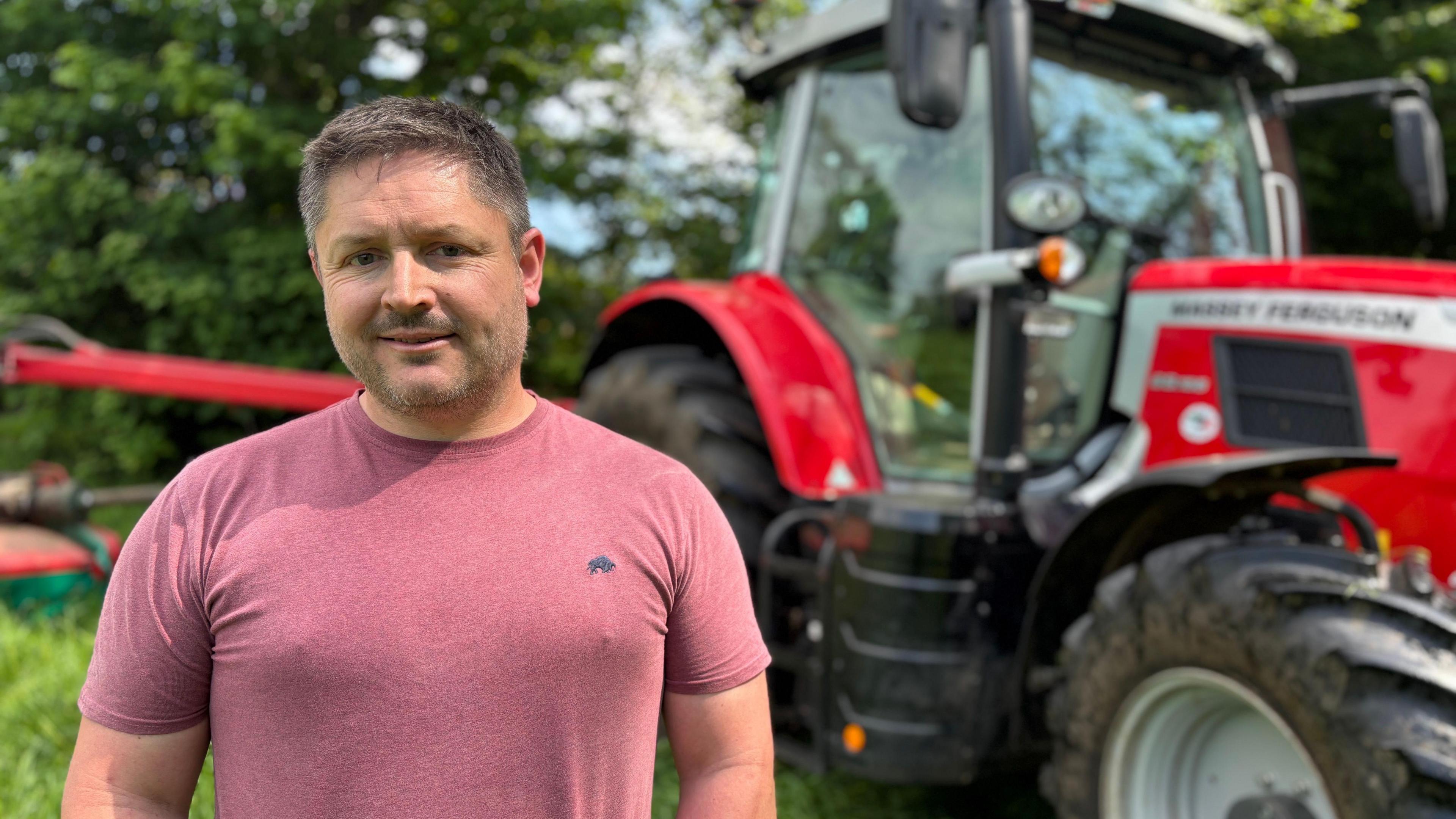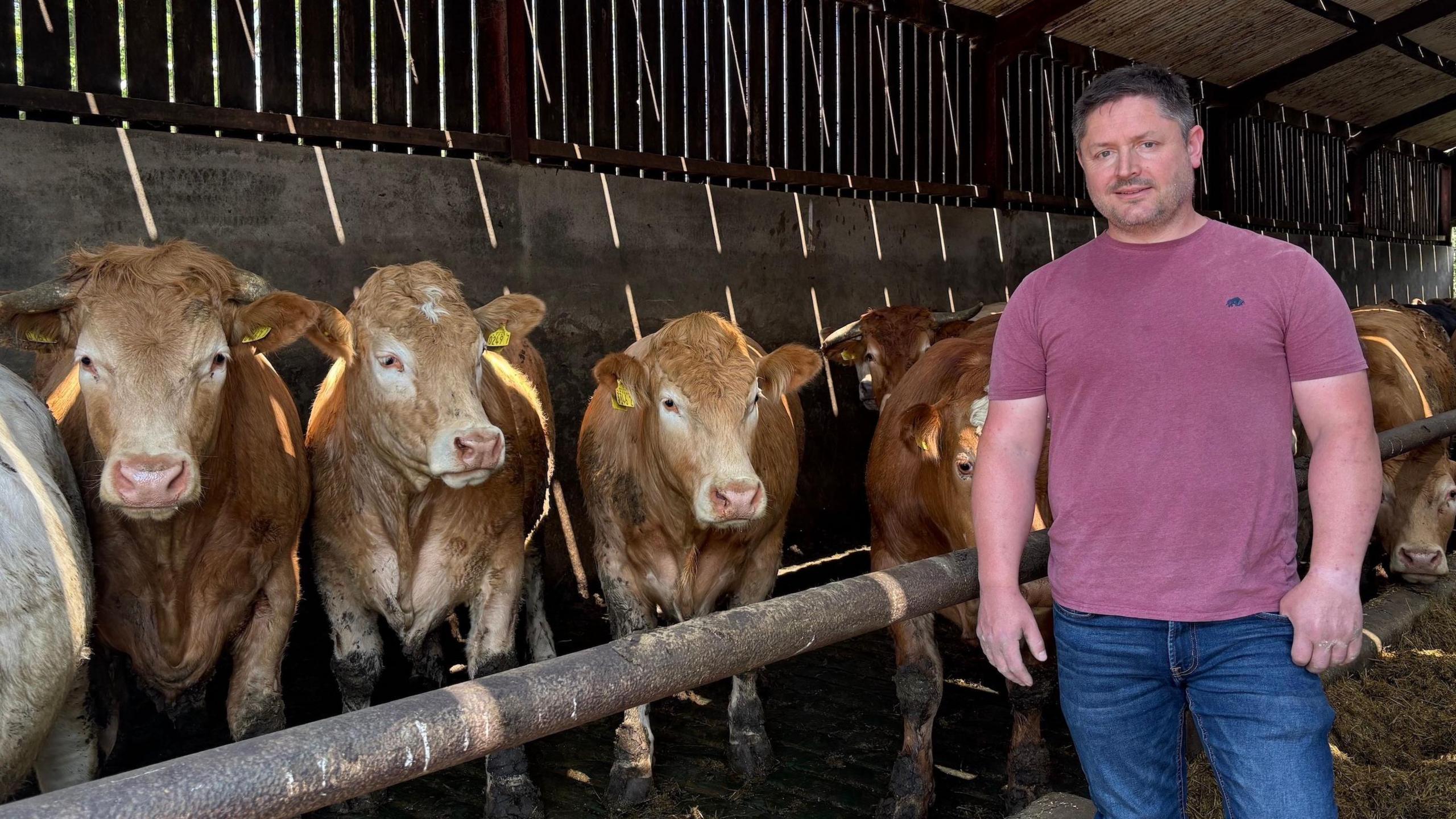How dangerous dust is putting farm workers' lives at risk

Jonny Tuft is exposed to damaging dust every day on his farm
- Published
The risks of working with animals and machinery on farms are well known, but agricultural workers are being reminded of another danger that is part of their everyday work.
The Health and Safety Executive (HSENI) have teamed up with other agencies to spread awareness of the dangerous of dust particles which can lead to scarring on the lungs at this year's Balmoral Show.
Johnny Tuft, a fourth generation farmer from Ballinderry in County Antrim, described being unable to stop coughing whilst in bed at night.
Previously, Mr Tuft said he would convince himself he would be "wasting" a doctor's time but now said he will take lung health more seriously in future.
More than 300 people a year die from work-related illnesses in Northern Ireland, according to HSENI.

Jonny Tuft is a beef, arable and poultry farmer
'Too easy to do without PPE'
Johnny Tuft farms a mixed farm with beef cattle, sheep, arable and poultry units and is often exposed to dust particles.
"We need to bed our livestock whether it be cattle or poultry and there's dust in the bedding," he said.
"We grow arable and we feed livestock with our own barley and through the whole cultivation process there's dust.
"When you're in the tractor there's dust, whenever we roll barley that creates a lot of dust and then feeding it too."
Wearing a mask would help reduce exposure but Mr Tuft said he often did not have time to protect himself.
"There's times where the mask isn't beside you or you're under time pressure and it's just too easy to go and do the job without PPE [personal protective equipment]," he said.
"Then maybe that night you're lying in bed and you can't stop coughing".

Brian Monson from HSENI wants farmers to take better care of their lungs
Spreading the message at Balmoral Show
Bryan Monson, the deputy chief executive of HSENI, is using the Balmoral Show to help spread the message of lung health to farmers.
"There's nothing like coming to Balmoral to meet people face to face and we can give them some really useful advice, along with our other partners, about how they look after themselves," he said.
Recent research carried out for the organisation showed how risky farming could be for respiratory health.
Farmers exposed to 'different dusts'
"For farmers unfortunately they're exposed to an awful lot of different dusts and chemicals and gases, and those can affect and damage people's lungs, and it's maybe not that well known or understood," Mr Monson said.
"So this year, what we're hoping to do is raise awareness of lung health and some of the simple things that people can do to protect themselves."
He said reducing exposure to dust was really important.
"People will immediately think 'I'm putting on a dust mask', and that can be part of the solution," he said.
"But as well as that, working in well ventilated areas, working upwind of dusty activities, wetting down dusts before they're brushed or moved around, and possibly buying pelleted forms of feeds and chemicals rather than loose forms.
"All of these can reduce your dust exposure."

Dr Sean Roe says 'prevention is better than cure' for lung health
Dust can lead to pulmonary fibrosis
Dr Sean Roe, a senior lecturer at Queens University Belfast's medical school, said farmers often dismissed the initial signs of a respiratory issues, which include sniffing, coughing or watery eyes.
He said it was better to try to prevent a respiratory issue rather than try to cure it. "to be working from the point of view of prevention rather than cure".
"Prevention is really the best way of dealing with it because in the long term, once you start to do permanent damage to the lungs, it's very hard to treat it," Dr Roe said.
"If you take in that dust and it stays down it can produce scar tissue in the lungs.
"The problem with scar tissue is - if you've ever had a scar on the back of your hand - you'll notice that the scar tissue isn't as flexible as the skin and it's similar in the lungs that over a long period of time, it leads to what's known as pulmonary fibrosis.
"Pulmonary fibrosis is a situation where the lungs become smaller and stiffer and less elastic and harder to inflate, and that can give rise to one of the problems which is known as chronic farmer's lungs."
'Tend not to go to the doctor'
Mr Tuft said he would now think more about his respiratory health when he is working.
"I think now that I'm starting to know people that have had health issues, long health issues from farms maybe I need to start taking it a bit more seriously," he said.
"I would tend not to go to the doctor unless I'm in pain. I would nearly convince myself I am wasting the doctor's time if it's just a cough, that I'll be fine in the morning.
"But maybe I should be more concerned."
- Published14 May
